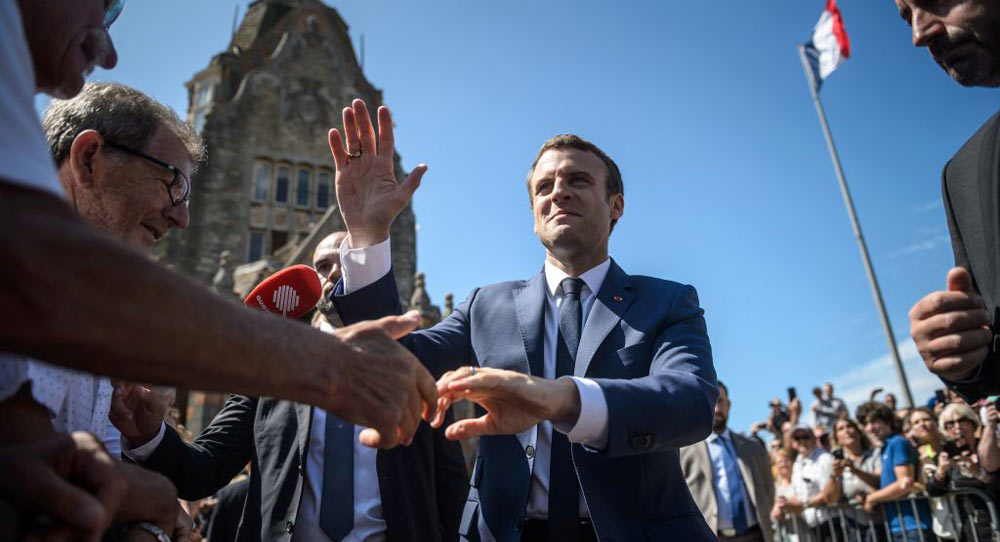The contrast could not have been starker. After the first round of the parliamentary election in France on June 11, President Emmanuel Macron’s novice Republic on the Move party and its ally, the Democratic Movement, were set to win a landslide victory in the 577-seat National Assembly. After all the ballots had been counted, the two parties together had won 32.3 percent of the votes and about 445 seats.
It was an astonishing victory for Macron, who only a year ago had no party and no political profile. But he was catapulted into power on a promise to introduce long-overdue reforms, pull Europe away from Euroskeptics and populists, and move the EU forward. He now has a clear mandate to do all three.
Across in London, British Prime Minister Theresa May was holed up in Number 10 Downing Street, her official residence. After her Conservative Party failed to win an outright majority in the UK general election on June 8, May was struggling to form a new government with the ultraconservative Democratic Unionist Party from Northern Ireland.
In addition, May retained most members of the cabinet and even brought back in Michael Gove, an archrival and outspoken anti-European. With talks due to begin on June 19 between London and Brussels over the terms of Britain’s departure from the EU, May enters these unprecedented discussions seriously weakened. Indeed, it is not even certain that she is strong enough inside her party to remain prime minister.
One thing, however, is certain. Despite May’s conviction that Brexit will be good for the country, and whether or not she can secure a deal with her interlocutors in Brussels, she is ushering in the decline of Britain’s influence in Europe and farther afield.
The opposite is happening in France. For far too long, France has been on the sidelines in Europe: starved of reforms that could open up the labor market by introducing more flexibility and saddled with high unemployment and a political class living on the politics of entitlement. Macron has pledged to take France out of this malaise.
When the second round of the parliamentary election is over on June 18, the president will have few excuses for hesitation or delay. The expectations from his supporters are high. But so is the opposition from trade unions and the vested interests that have become entrenched over the years. Attempts at reforms have often met tough resistance from the public sector, with successive presidents and prime ministers caving in.
The reforms that Macron intends to introduce will not only have an impact on France. If they spur growth, they will also give Macron the confidence to reassert Paris’s influence in the EU. For too long, France has been almost absent from articulating the EU’s future direction. That was largely left up to Germany.
But German Chancellor Angela Merkel, who is seeking a fourth term in September’s federal election, had held back from pushing for further economic and political integration. That wasn’t because it would require changes to the EU’s treaties—the current Lisbon Treaty has not been used to the full. It was because of the political atmosphere, in which populists, antiglobalization movements, and Euroskeptic parties crowded out those who advocated a stronger and more integrated EU.
Furthermore, even if Merkel supported more integration, she would need allies. Until now, she could not rely on France because it was so weak. Macron’s double victory has changed the dynamics of Europe.
These dynamics are not yet defined. The EU and most European leaders are uncertain about the bloc’s strategic course. President Donald Trump is already changing the way in which the U.S. administration views allies. He is taking an unsentimental view of the roles of interests, values, and alliances that may force European leaders out of their complacency and the belief that muddling through is a solution to the bloc’s deep-seated problems.
The main challenge facing Macron, Merkel, and all the other EU leaders is not the lack of coherent foreign, security, and defense policies—although this is a serious handicap for this prosperous and democratic continent. It is the absence of an open discussion about how Europe is doing to deal with digitization and its impact on the social and economic fabric of democratic societies. The role of social media is already changing political decisionmaking and the activities of groups that seek to threaten, terrorize, and kill.
Yes, Macron’s determination to move his country forward is a tonic for the rest of Europe. But the big task of confronting digitization has yet to be addressed. That is a task that cannot be postponed.










